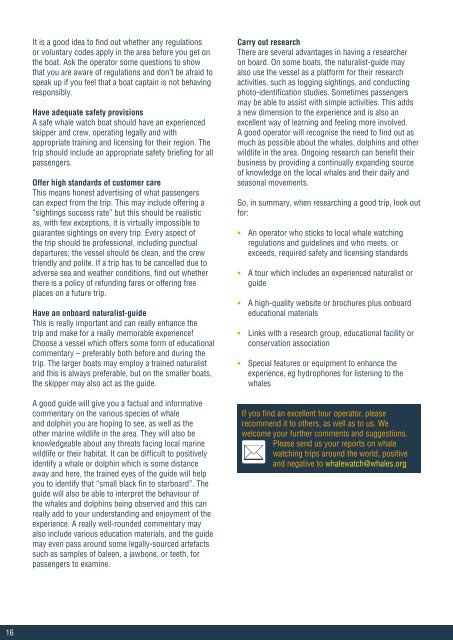Responsible Whale Watching
1gkqDcLwd
1gkqDcLwd
Create successful ePaper yourself
Turn your PDF publications into a flip-book with our unique Google optimized e-Paper software.
It is a good idea to find out whether any regulations<br />
or voluntary codes apply in the area before you get on<br />
the boat. Ask the operator some questions to show<br />
that you are aware of regulations and don’t be afraid to<br />
speak up if you feel that a boat captain is not behaving<br />
responsibly.<br />
Have adequate safety provisions<br />
A safe whale watch boat should have an experienced<br />
skipper and crew, operating legally and with<br />
appropriate training and licensing for their region. The<br />
trip should include an appropriate safety briefing for all<br />
passengers.<br />
Offer high standards of customer care<br />
This means honest advertising of what passengers<br />
can expect from the trip. This may include offering a<br />
“sightings success rate” but this should be realistic<br />
as, with few exceptions, it is virtually impossible to<br />
guarantee sightings on every trip. Every aspect of<br />
the trip should be professional, including punctual<br />
departures; the vessel should be clean, and the crew<br />
friendly and polite. If a trip has to be cancelled due to<br />
adverse sea and weather conditions, find out whether<br />
there is a policy of refunding fares or offering free<br />
places on a future trip.<br />
Have an onboard naturalist-guide<br />
This is really important and can really enhance the<br />
trip and make for a really memorable experience!<br />
Choose a vessel which offers some form of educational<br />
commentary – preferably both before and during the<br />
trip. The larger boats may employ a trained naturalist<br />
and this is always preferable, but on the smaller boats,<br />
the skipper may also act as the guide.<br />
A good guide will give you a factual and informative<br />
commentary on the various species of whale<br />
and dolphin you are hoping to see, as well as the<br />
other marine wildlife in the area. They will also be<br />
knowledgeable about any threats facing local marine<br />
wildlife or their habitat. It can be difficult to positively<br />
identify a whale or dolphin which is some distance<br />
away and here, the trained eyes of the guide will help<br />
you to identify that “small black fin to starboard”. The<br />
guide will also be able to interpret the behaviour of<br />
the whales and dolphins being observed and this can<br />
really add to your understanding and enjoyment of the<br />
experience. A really well-rounded commentary may<br />
also include various education materials, and the guide<br />
may even pass around some legally-sourced artefacts<br />
such as samples of baleen, a jawbone, or teeth, for<br />
passengers to examine.<br />
Carry out research<br />
There are several advantages in having a researcher<br />
on board. On some boats, the naturalist-guide may<br />
also use the vessel as a platform for their research<br />
activities, such as logging sightings, and conducting<br />
photo-identification studies. Sometimes passengers<br />
may be able to assist with simple activities. This adds<br />
a new dimension to the experience and is also an<br />
excellent way of learning and feeling more involved.<br />
A good operator will recognise the need to find out as<br />
much as possible about the whales, dolphins and other<br />
wildlife in the area. Ongoing research can benefit their<br />
business by providing a continually expanding source<br />
of knowledge on the local whales and their daily and<br />
seasonal movements.<br />
So, in summary, when researching a good trip, look out<br />
for:<br />
■■<br />
■■<br />
■■<br />
■■<br />
■■<br />
An operator who sticks to local whale watching<br />
regulations and guidelines and who meets, or<br />
exceeds, required safety and licensing standards<br />
A tour which includes an experienced naturalist or<br />
guide<br />
A high-quality website or brochures plus onboard<br />
educational materials<br />
Links with a research group, educational facility or<br />
conservation association<br />
Special features or equipment to enhance the<br />
experience, eg hydrophones for listening to the<br />
whales<br />
If you find an excellent tour operator, please<br />
recommend it to others, as well as to us. We<br />
welcome your further comments and suggestions.<br />
Please send us your reports on whale<br />
watching trips around the world, positive<br />
and negative to whalewatch@whales.org<br />
© Ulla Christina Ludewig<br />
16 17


